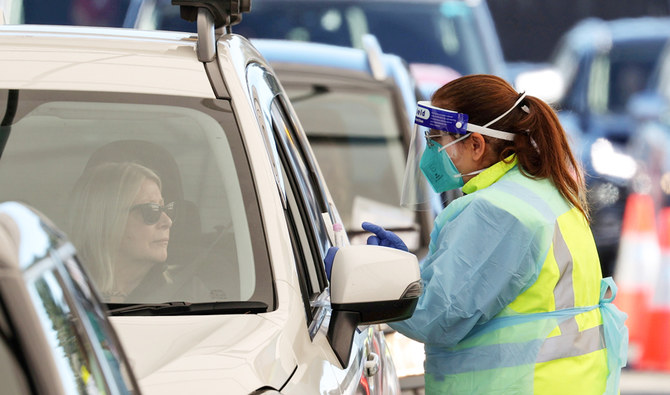SYDNEY: Australia’s New South Wales state on Friday reported its biggest daily rise in new COVID-19 cases this year, prompting state officials to tighten lockdown measures in Sydney in what they called a “national emergency.”
State Premier Gladys Berejiklian also flagged the likelihood that stay-home orders for the country’s biggest city would be extended beyond the current end date of July 30.
“There is no doubt that the numbers are not going in the direction we were hoping they would at this stage,” Berejiklian said as she announced 136 new cases in New South Wales.
Total infections in Australia’s worst outbreak since the peak of the pandemic last year have jumped to just over 1,900 since the first case was detected in a Sydney limousine driver transporting international flight crews in mid-June.
The outbreak of the fast-moving Delta strain was carried across borders to the neighboring states of Victoria and South Australia, leading to measures that have put more than half the country’s population in lockdown. That has shut down down large parts of the economy, even as other parts of the world, including Britain and the United States, open up..
New Zealand Prime Minister Jacinda Ardern on Friday suspended for at least eight weeks the so-called “travel bubble” with Australia that allows movement between the two countries without quarantine. The arrangement had already been paused for travelers to and from New South Wales, Victoria and South Australia.
Crucially, at least 53 of the new cases in Sydney were infectious in the community before being diagnosed. Authorities have said that figure needs to be near zero for a lockdown in the New South Wales capital to be lifted.
State chief health officer Kerry Chant said a national vaccination program needed to be refocused on the Sydney hotspots.
“I have advised the government today that this is a national emergency, and requires additional measures to reduce the case number,” Chant said.
A formalized “national emergency” would typically unlock federal government funding and other assistance.
In contrast to New South Wales, Victoria state officials reported a fall in new daily cases on Friday to 14, adding that 10 of those were in quarantine during their entire infectious period.
VACCINE ROLLOUT
With just over 32,500 COVID-19 cases and 916 deaths, Australia has fared much better than many other developed economies, but stop-and-start lockdowns and a sluggish vaccine rollout have frustrated residents.
About 15 percent of adult Australians have been fully vaccinated, a rate that is well behind many other developed nations.
Morrison on Thursday apologized for the slow vaccination rollout. His government is targeting full vaccination of the adult population by the end of the year. Just 15 percent have been vaccinated so far.
Federal Health Minister Greg Hunt on Friday said the country’s drug regulator has approved the use of Pfizer’s COVID-19 vaccine in children aged 12 to 15, although there were no immediate plans to add that group to the national rollout.
The Sydney lockdown is currently scheduled to run until July 30, while strict stay-home orders in Victoria and South Australia are in place until July 27.




























